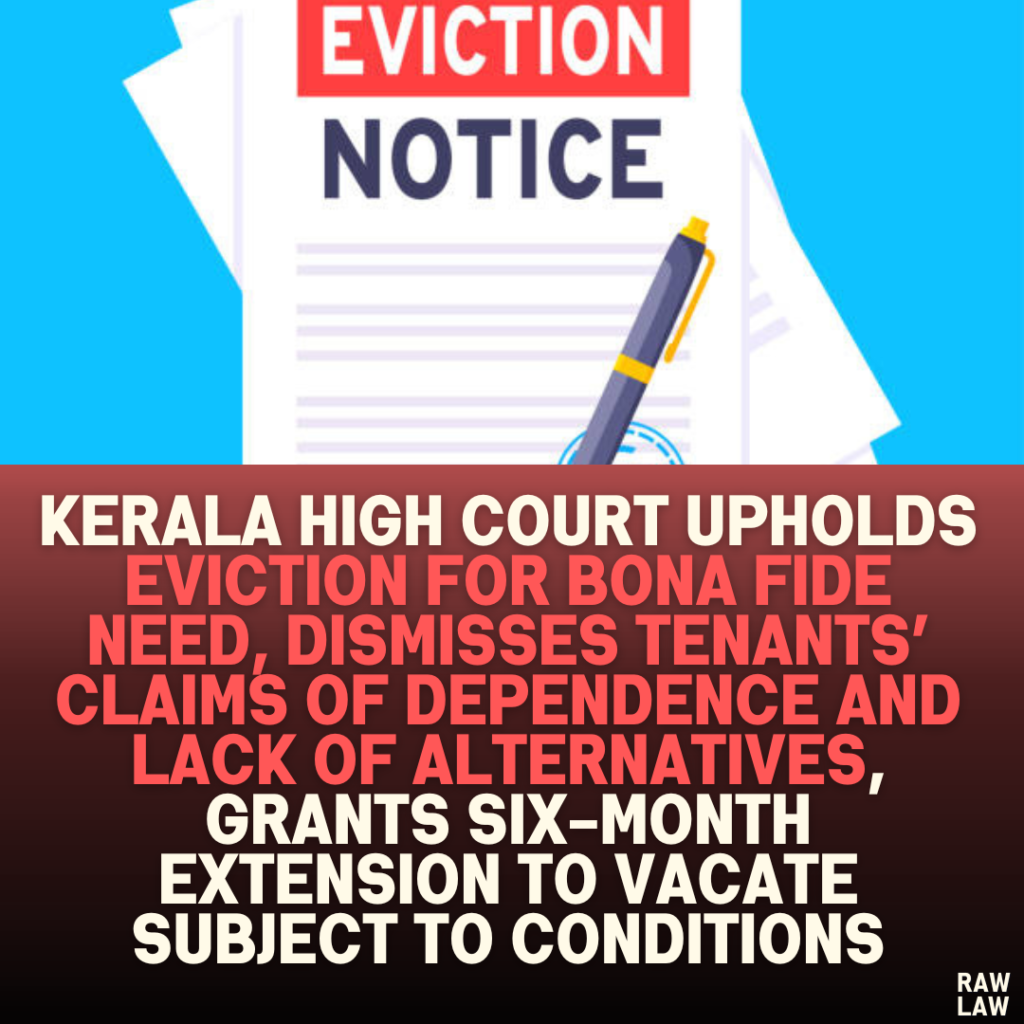Court’s Decision:
The Kerala High Court dismissed the revision petition filed by the tenants under Section 20 of the Kerala Buildings (Lease and Rent Control) Act, 1965, challenging concurrent findings of eviction orders by the Rent Control Court and the Rent Control Appellate Authority. The High Court found that the landlords had established a bona fide need for the premises and that the tenants had failed to substantiate their entitlement to the benefits under the second proviso of Section 11(3).
The Court granted the tenants six months to vacate the premises, subject to compliance with specific conditions, including an undertaking to vacate and depositing all arrears of rent.
Facts of the Case:
- The landlords sought eviction of tenants from a rented premises, claiming a bona fide need to start a tea shop.
- The Rent Control Court allowed the petition, finding the landlords’ need genuine and directing the tenants to vacate.
- The Appellate Authority upheld the eviction order.
- The tenants filed a revision petition before the High Court, asserting their dependence on the premises for livelihood and lack of alternative accommodations.
Issues:
- Whether the landlords had established a bona fide need under Section 11(3) of the Kerala Buildings (Lease and Rent Control) Act.
- Whether the tenants were entitled to the benefits of the second proviso to Section 11(3), which protects tenants depending on the premises for livelihood if no alternative premises are available.
Petitioners’ (Tenants’) Arguments:
- Dependence on the Premises: The tenants claimed their business in the premises was their primary source of income.
- Lack of Alternative Premises: They argued no other suitable buildings were available in the locality.
- Improper Appreciation of Evidence: The tenants contended that the Rent Control Court and the Appellate Authority failed to properly evaluate their evidence regarding the second proviso to Section 11(3).
Respondents’ (Landlords’) Arguments:
- Genuine and Bona Fide Need: The landlords submitted that their requirement for the premises to start a tea shop was sincere, honest, and unshaken during cross-examination.
- Failure of Tenants to Prove Their Case: The tenants did not provide evidence to substantiate either their dependence on the premises or the unavailability of alternative accommodations.
- Burden of Proof Lies with Tenants: The landlords emphasized that, under the second proviso to Section 11(3), tenants must prove their entitlement to protection.
Analysis of the Law:
Section 11(3) of the Act provides for eviction of tenants if the landlord establishes a bona fide need for the premises, subject to two provisos:
- The landlord must not have another suitable premises.
- The tenant must prove:
- Dependence on the premises for livelihood.
- Non-availability of alternative premises in the locality.
Key Legal Principles Applied:
- Presumption of Bona Fide Need: As held in E.C. Jose v. V. Gopalakrishnan, landlords’ bona fide need is presumed genuine unless disproved by evidence.
- Burden of Proof on Tenant: As clarified in Sunny Padamadan Rafael v. Vijaya Shenoy, tenants must conjunctively prove both limbs of the second proviso for protection.
- Scope of Revisional Jurisdiction: The High Court’s revisional power is limited to examining legality and propriety, not re-appreciating evidence (as per Rukmini Amma Saradamma v. Kallyani Sulochana).
Precedent Analysis:
- Moideen Kutty K. v. Maniparambil Viswanathan Nair (2022): Landlord’s bona fide need must be real and sincere; tenant bears the burden under the provisos.
- Rukmini Amma Saradamma (1993): Revisional jurisdiction does not allow re-appreciation of evidence.
- Hindustan Petroleum Corporation v. Dilbahar Singh (2014): High Court’s role is to ensure legality and regularity, not to act as a second appellate court.
Court’s Reasoning:
- Landlords’ Bona Fide Need: The landlords’ requirement for the premises was found to be genuine, sincere, and supported by unshaken testimony.
- Tenants’ Failure to Discharge Burden: The tenants failed to provide evidence proving dependence on the premises or the absence of alternative accommodations.
- Limited Scope of Revisional Jurisdiction: The Court emphasized that it could not re-appreciate evidence and was bound to respect the concurrent findings unless they were perverse.
Conclusion:
The High Court dismissed the tenants’ revision petition, upholding the eviction order. However, it allowed the tenants six months to vacate, subject to the following conditions:
- Filing an unconditional undertaking to vacate within six months.
- Depositing all arrears of rent and paying monthly rent without default.
- Avoiding subletting or transferring the premises during this period.
Failure to comply with any condition would automatically cancel the time extension.
Implications:
- Clarification of Tenant’s Burden: The judgment reinforces that tenants bear the responsibility of proving dependence and lack of alternatives under the second proviso to Section 11(3).
- Revisional Jurisdiction Boundaries: It highlights the limitations of the High Court’s power in rent control cases, ensuring respect for findings by lower authorities.
- Protection of Landlords’ Rights: The decision affirms landlords’ rights to reclaim premises for bona fide needs, provided such needs are genuine and legally substantiated.
